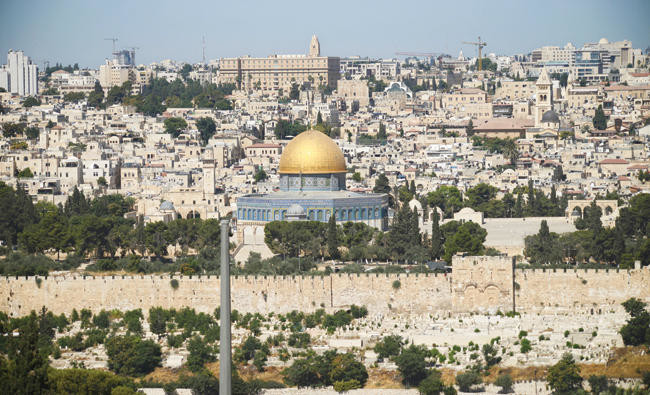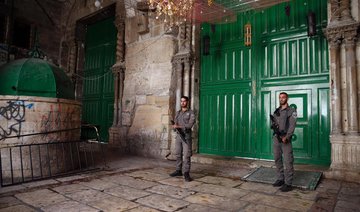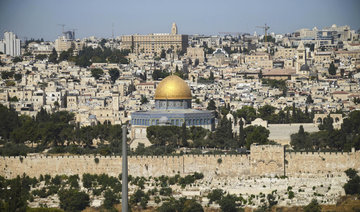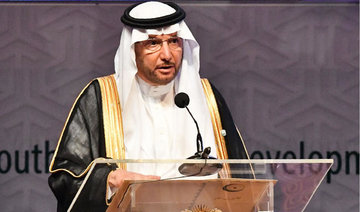JERUSALEM: Security forces locked down parts of Jerusalem’s Old City on Saturday and an ultra-sensitive holy site remained closed after an attack that killed two police officers and heightened Israeli-Palestinian tensions.
Three Arab Israeli assailants opened fire on Israeli police Friday in the Old City before fleeing to the nearby Haram Al-Sharif, known to Jews as the Temple Mount, where they were shot dead by police.
Israeli authorities said they had come from the flashpoint holy site, which includes the Al-Aqsa Mosque and the Dome of the Rock, to commit the attack.
The authorities took the highly unusual decision to close the Al-Aqsa mosque compound for Friday prayers, leading to anger from Muslims and Jordan, the holy site’s custodian.
Wael Arabiyat, Jordan’s Islamic Affairs Minister, warned that keeping Al-Aqsa mosque closed is “dangerous” and “unprecedented.”
On Friday, Amman called for the immediate reopening of the mosque.
Israeli Prime Minister Benjamin Netanyahu has indicated it will stay closed until at least Sunday while security was assessed, and rejected Jordan’s criticism.
“Instead of denouncing the terrorist attack, Jordan chose to attack Israel,” Netanyahu was quoted as saying by officials, and called for restraint.
Netanyahu also spoke of increasing security at entrances to the site when it reopens — likely to be a controversial move.
On Saturday, access was restricted through Damascus Gate, the main entrance used by Palestinians into Jerusalem’s Old City, and only residents with identification were allowed to pass.
“This is not security. This is punishment,” said Bader Jweihan, 53, an accountant who was denied entry.
“They want to punish the Arab Jerusalem citizens.”
Musa Abdelmenam Qussam, 73 and with poor eyesight, was helped by a grandson as he walked with a cane and sought to enter.
But the owner of a book wholesale shop in the Old City was also turned away.
“This mosque is not only for Muslims. Tourists come,” he said, adding that he usually prays at Al-Aqsa every day.
“This city is for all the world. It must be open.”
Jaffa Gate, heavily used by tourists and near the Old City’s Jewish Quarter, was open but with a heavy police presence.
A group of tourists from Poland said they were concerned when they heard about Friday’s shooting but wanted to continue their visit.
They were on their way to do some shopping in the Old City and visit the nearby Garden of Gethsemane, where Christians believe Jesus prayed the night before his crucifixion.
“It stressed me a little,” said Ewa, who did not want to give her last name or age.
At Lions Gate near the site of the attack, police guarded the entrance and restricted access, checking IDs.
The attack and aftermath was one of the most serious incidents in Jerusalem in recent years.
Palestinian president Mahmud Abbas and Netanyahu spoke by phone on Friday as tensions rose in the wake of the incident.
Israeli authorities also detained Jerusalem’s top Muslim cleric, grand mufti Muhammad Ahmad Hussein, as crowds gathered at the gates of the Old City after the attack, his son said.
Hussein, who had criticized the closure of Al-Aqsa, was released later Friday after being questioned, according to another of his sons.
With Al-Aqsa closed, crowds gathered at Old City gates and held Friday prayers there instead.
The Palestinian director of the Waqf (religious property) council, Abdel Azim Salhab, said the closure of the mosque compound was the “worst aggression since 1967” — a reference to the start of Israel’s occupation of east Jerusalem which it later annexed.
The Haram Al-Sharif/Temple Mount is central to the Israeli-Palestinian conflict, with Palestinians fearing Israel may one day seek to assert further control over it.
It is considered the third holiest site in Islam and the most sacred for Jews.
Jews are allowed to visit but not pray there to avoid provoking tensions.
Israel’s annexation of east Jerusalem after the 1967 Six-Day War was never recognized by the international community.
A wave of unrest that broke out in October 2015 has claimed the lives of at least 281 Palestinians or Arab Israelis, 44 Israelis, two Americans, two Jordanians, an Eritrean, a Sudanese and a Briton, according to an AFP toll.
Israeli authorities say most of the Palestinians killed were carrying out knife, gun or car-ramming attacks.
Others were shot dead in protests and clashes, while some were killed in Israeli air strikes on the Gaza Strip.
The violence had greatly subsided in recent months.
Security tight, holy site shut after Jerusalem attack
Security tight, holy site shut after Jerusalem attack

Gaza war death toll could be 40 percent higher, says study
They estimated 64,260 deaths due to traumatic injury during this period, about 41 percent higher than the official Palestinian Health Ministry count
LONDON: An official Palestinian tally of direct deaths in the Israel-Hamas war likely undercounted the number of casualties by around 40 percent in the first nine months of the war as the Gaza Strip’s health care infrastructure unraveled, according to a study published on Thursday.
The peer-reviewed statistical analysis published in The Lancet journal was conducted by academics at the London School of Hygiene and Tropical Medicine, Yale University and other institutions.
Using a statistical method called capture-recapture analysis, the researchers sought to assess the death toll from Israel’s air and ground campaign in Gaza between October 2023 and the end of June 2024.
They estimated 64,260 deaths due to traumatic injury during this period, about 41 percent higher than the official Palestinian Health Ministry count. The study said 59.1 percent were women, children and people over the age of 65. It did not provide an estimate of Palestinian combatants among the dead.
More than 46,000 people have been killed in the Gaza war, according to Palestinian health officials, from a pre-war population of around 2.1 million.
A senior Israeli official, commenting on the study, said Israel’s armed forces went to great lengths to avoid civilian casualties.
“No other army in the world has ever taken such wide-ranging measures,” the official said.
“These include providing advance warning to civilians to evacuate, safe zones and taking any and all measures to prevent harm to civilians. The figures provided in this report do not reflect the situation on the ground.”
The war began on Oct. 7 after Hamas gunmen stormed across the border with Israel, killing 1,200 people and taking more than 250 hostages, according to Israeli tallies.
The Lancet study said the Palestinian health ministry’s capacity for maintaining electronic death records had previously proven reliable, but deteriorated under Israel’s military campaign, which has included raids on hospitals and other health care facilities and disruptions to digital communications.
Israel accuses Hamas of using hospitals as cover for its operations, which the militant group denies.
STUDY METHOD EMPLOYED IN OTHER CONFLICTS
Anecdotal reports suggested that a significant number of dead remained buried in the rubble of destroyed buildings and were therefore not included in some tallies.
To better account for such gaps, the Lancet study employed a method used to evaluate deaths in other conflict zones, including Kosovo and Sudan.
Using data from at least two independent sources, researchers look for individuals who appear on multiple lists of those killed. Less overlap between lists suggests more deaths have gone unrecorded, information that can be used to estimate the full number of deaths.
For the Gaza study, researchers compared the official Palestinian Health Ministry death count, which in the first months of war was based entirely on bodies that arrived in hospitals but later came to include other methods; an online survey distributed by the health ministry to Palestinians inside and outside the Gaza Strip, who were asked to provide data on Palestinian ID numbers, names, age at death, sex, location of death, and reporting source; and obituaries posted on social media.
“Our research reveals a stark reality: the true scale of traumatic injury deaths in Gaza is higher than reported,” lead author Zeina Jamaluddine told Reuters.
Dr. Paul Spiegel, director of the Center for Humanitarian Health at the Johns Hopkins Bloomberg School of Public Health, told Reuters that the statistical methods deployed in the study provide a more complete estimate of the death toll in the war.
The study focused solely on deaths caused by traumatic injuries though, he said.
Deaths caused from indirect effects of conflict, such as disrupted health services and poor water and sanitation, often cause high excess deaths, said Spiegel, who co-authored a study last year that projected thousands of deaths due to the public health crisis spawned by the war.
The Palestinian Central Bureau of Statistics (PCBS) estimates that, on top of the official death toll, around another 11,000 Palestinians are missing and presumed dead.
In total, PCBS said, citing Palestinian Health Ministry numbers, the population of Gaza has fallen 6 percent since the start of the war, as about 100,000 Palestinians have also left the enclave.
Syria monitor says alleged Assad loyalist ‘executed’ in public

- Fighters affiliated with the new authorities executed Mazen Kneneh with a shot to the head in the street
BEIRUT: A Syria monitor said fighters linked to the Islamist-led transitional administration publicly executed a local official on Friday, accusing him of having been an informant under ousted strongman Bashar Assad.
The Britain-based Syrian Observatory for Human Rights said fighters affiliated with the new authorities executed Mazen Kneneh with a shot to the head in the street in the Damascus suburb of Dummar, describing him as “one of the best-known loyalists of the former regime.”
Japan congratulates Lebanon on electing new President

- The ministry also said that Japan will continue to support Lebanon
TOKYO: The Government of Japan said it congratulates Lebanon on the election of the new President Joseph Aoun on January 9.
A statement by the Foreign Ministry said while Lebanon has been facing difficult situations such as a prolonged economic crisis and the exchange of attacks between Israel and Hezbollah, the election of a new President is an important step toward stability and development of the country.
“Japan once again strongly demands all parties concerned to fully implement the ceasefire agreement between Israel and Lebanon,” the statement added.
The ministry also said that Japan will continue to support Lebanon’s efforts on achieving social and economic stability in the country as well as stability in the Middle East region.
Lebanon PM to visit new Damascus ruler on Saturday

- Lebanon’s Prime Minister Najib Mikati will on Saturday make his first official trip to neighboring Syria since the fall of president Bashar Assad, his office told AFP
BERUIT: Lebanon’s Prime Minister Najib Mikati will on Saturday make his first official trip to neighboring Syria since the fall of president Bashar Assad, his office told AFP.
Mikati’s office said Friday the trip came at the invitation of the country’s new de facto leader Ahmed Al-Sharaa during a phone call last week.
Syria imposed new restrictions on the entry of Lebanese citizens last week, two security sources have told AFP, following what the Lebanese army said was a border skirmish with unnamed armed Syrians.
Lebanese nationals had previously been allowed into Syria without a visa, using just their passport or ID card.
Lebanon’s eastern border is porous and known for smuggling.
Lebanese Shiite group Hezbollah supported Assad with fighters during Syria’s civil war.
But the Iran-backed movement has been weakened after a war with Israel killed its long-time leader and Islamist-led rebels seized Damascus last month.
Lebanese lawmakers elected the country’s army chief Joseph Aoun as president on Thursday, ending a vacancy of more than two years that critics blamed on Hezbollah.
For three decades under the Assad clan, Syria was the dominant power in Lebanon after intervening in its 1975-1990 civil war.
Syria eventually withdrew its troops in 2005 under international pressure after the assassination of Lebanese ex-prime minister Rafic Hariri.
UN says 3 million Sudan children facing acute malnutrition

- Famine has already gripped five areas across Sudan, according to a report last month
- Sudan has endured 20 months of war between the army and the paramilitary forces
PORT SUDAN, Sudan: An estimated 3.2 million children under the age of five are expected to face acute malnutrition this year in war-torn Sudan, according to the United Nations Children’s Fund (UNICEF).
“Of this number, around 772,000 children are expected to suffer from severe acute malnutrition,” Eva Hinds, UNICEF Sudan’s Head of Advocacy and Communication, told AFP late on Thursday.
Famine has already gripped five areas across Sudan, according to a report last month by the Integrated Food Security Phase Classification (IPC), a UN-backed assessment.
Sudan has endured 20 months of war between the army and the paramilitary Rapid Support Forces (RSF), killing tens of thousands and, according to the United Nations, uprooting 12 million in the world’s largest displacement crisis.
Confirming to AFP that 3.2 million children are currently expected to face acute malnutrition, Hinds said “the number of severely malnourished children increased from an estimated 730,000 in 2024 to over 770,000 in 2025.”
The IPC expects famine to expand to five more parts of Sudan’s western Darfur region by May — a vast area that has seen some of the conflict’s worst violence. A further 17 areas in western and central Sudan are also at risk of famine, it said.
“Without immediate, unhindered humanitarian access facilitating a significant scale-up of a multisectoral response, malnutrition is likely to increase in these areas,” Hinds warned.
Sudan’s army-aligned government strongly rejected the IPC findings, while aid agencies complain that access is blocked by bureaucratic hurdles and ongoing violence.
In October, experts appointed by the United Nations Human Rights Council accused both sides of using “starvation tactics.”
On Tuesday the United States determined that the RSF had “committed genocide” and imposed sanctions on the paramilitary group’s leader.
Across the country, more than 24.6 million people — around half the population — face “high levels of acute food insecurity,” according to IPC, which said: “Only a ceasefire can reduce the risk of famine spreading further.”



















